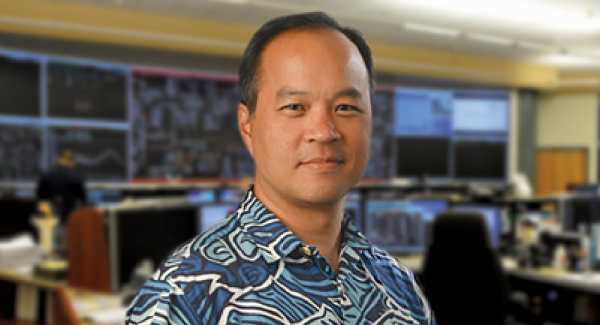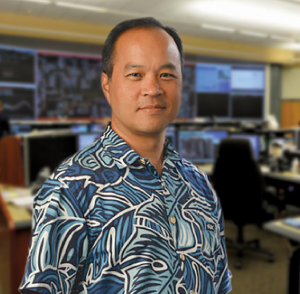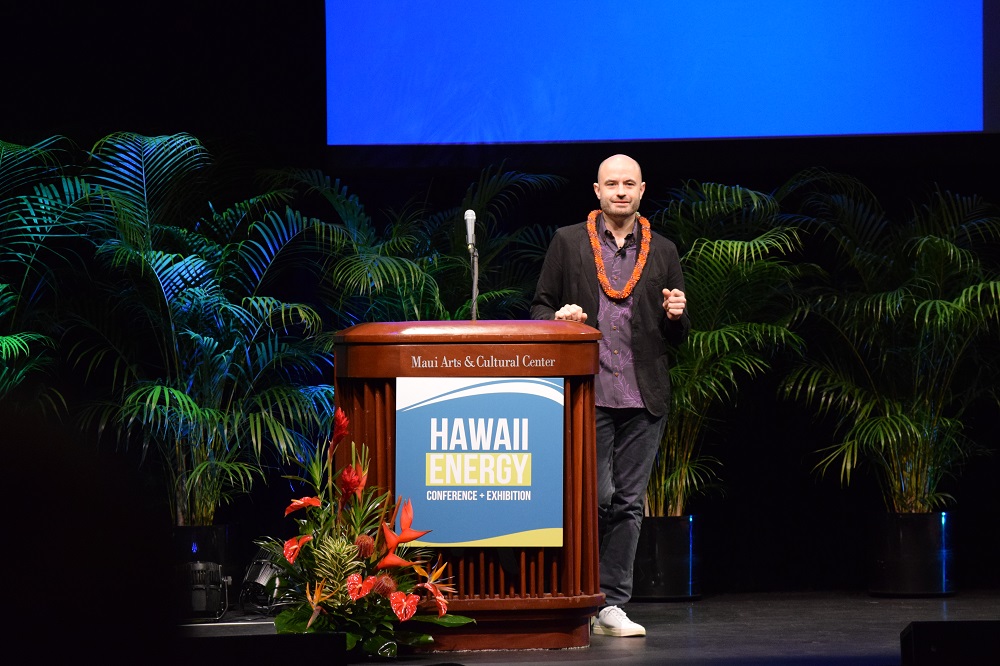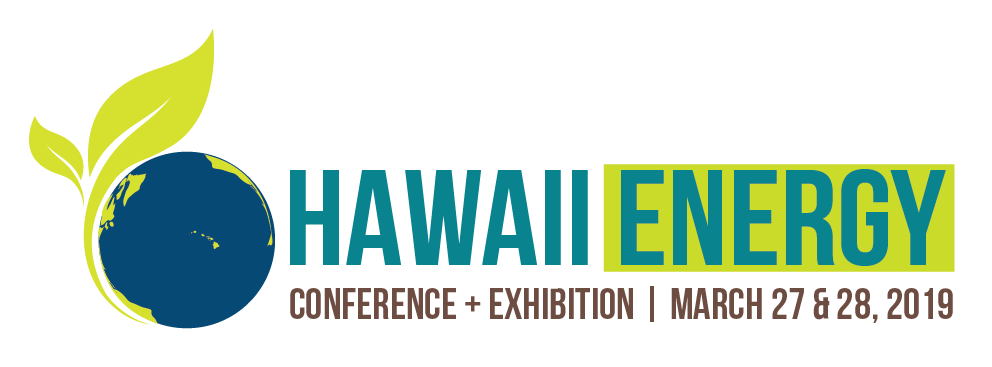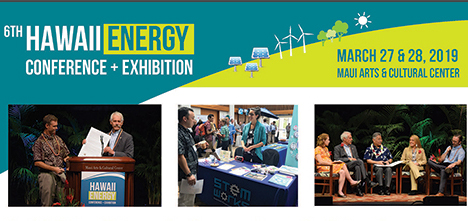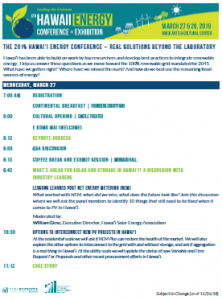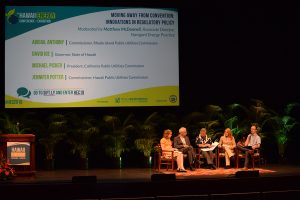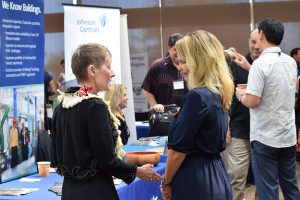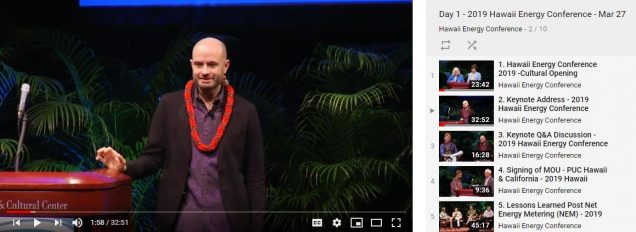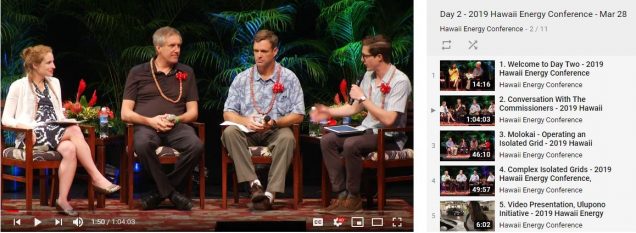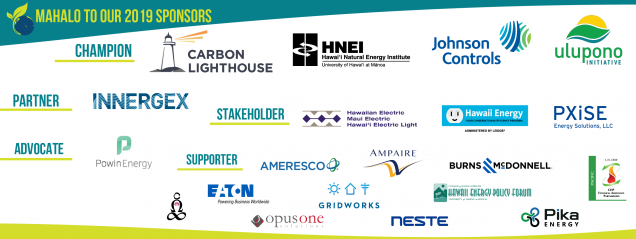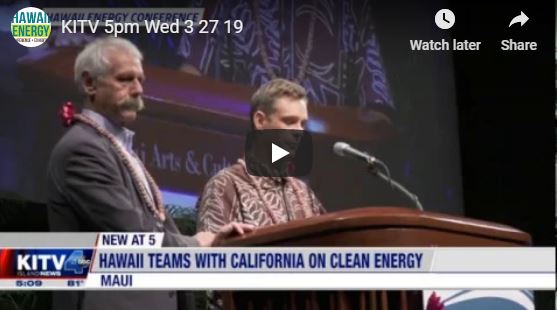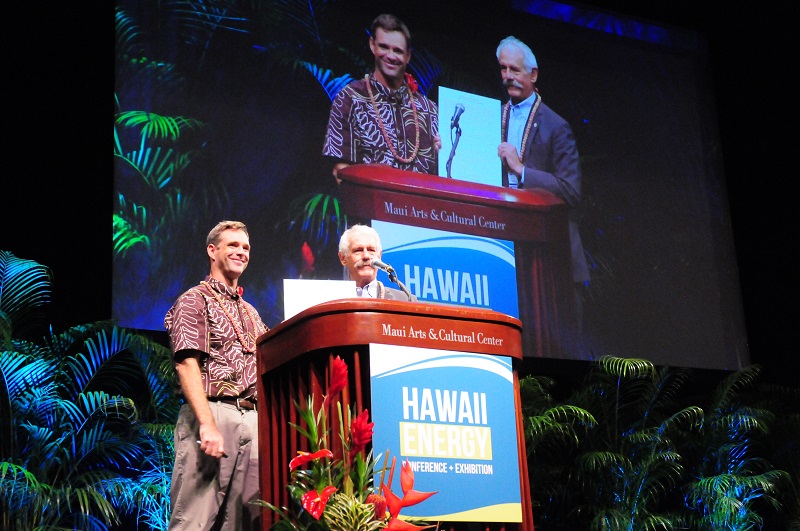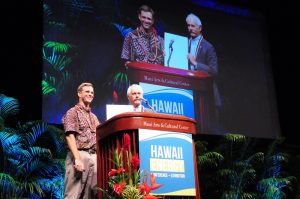
by HEC Team | Feb 10, 2020 | 2020, News

Rachel Huang, Director of Energy Strategy, Research and Development for Sacramento Municipal Utility District (SMUD), will be the keynote speaker at the 2020 Hawaii Energy Conference
The Director of Energy Strategy, Research and Development for Sacramento Municipal Utility District (SMUD), Rachel Huang, will be the Keynote speaker for the 7th Annual Hawaii Energy Conference (HEC) on Day 1. Presented by Maui Economic Development Board (MEDB), the two-day conference is on March 18 & 19 at the Maui Arts and Cultural Center.
The HEC will take a deep dive into how electrification can be “beneficial” and what is required to design an equitable energy transition. SMUD, a nonprofit power company, is on the forward edge of power-grid technology, successfully integrating distributed renewable-energy resources into its energy mix.
In her role at SMUD, Huang oversees the development of strategy for new business models, demonstrations, and evolution of utility functions in the face of an increasingly distributed energy future. Her responsibilities include the development of the strategic roadmap for distributed energy resources, the research and demonstration of innovative and emerging technologies, and the coordination of their execution across the enterprise.
Jennifer Potter, member of the Hawaiʻi Public Utilities Commission, observed, “Rachel Haung hired me at SMUD 10 years ago as a demand side specialist. Under her leadership, I developed a deep understanding of what it means to provide outstanding service our community thorough programs and services developed for every customer, in every sector. She is a beacon of light for our industry.”
Huang also serves on the board for the Consortium for Energy Efficiency (CEE) and represents Region 6 on the American Public Power Association’s Demonstration of Energy & Efficiency Development (DEED) Program Board.
“For more than a decade, Rachel Haung has been a thought leader for customer focused programs and services,” remarked Frank De Rego Jr, Vice Chair of the Conference and MEDB’s Director of Business Development Projects. “She has led numerous teams at SMUD that have developed innovative solutions that streamline interconnection practices for DERs (Distributed Energy Resources), advanced programs that provide services to underserved communities, and effectuated SMUD’s research and development DER activities.”
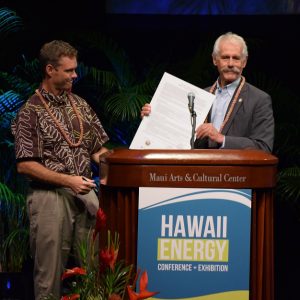
The 2019 MOU signing between California and Hawaii committing to 100-percent clean-energy goals. L to R: James Griffin, Chairman Hawaii PUC; Michael Picker, President California PUC
The HEC program will also feature a signing of a Memorandum of Understanding (MOU) with California on climate change. “Hawaii will be the sixth state to join the Western Public Utility Commissions’ (PUC) Joint Action Framework on Climate Change,” said Potter. The MOU affirms a commitment to ensure that investor-owned utilities operate in a manner that protects human health and safety, the environment, and ratepayers from risks related to carbon pollution.
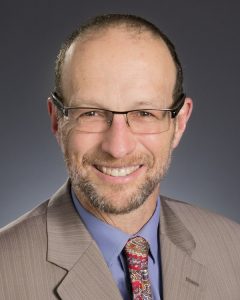
Clifford Rechtschaffen, Commissioner California PUC
James Griffin, Chairman of the Hawaii PUC will be joined on stage by Clifford Rechtschaffen, Commissioner for the California PUC, for the formal signing of the MOU. Rechtschaffen will also speak on a panel titled ‘Catching up with the Commission. Hawaii PUC Initiatives such as Performance Based Regulation.’ Moderated by Potter, the other two panelists will be Cara Goldenberg of the Rocky Mountain Institute and Mark Kolesar, Chair of the Alberta PUC.
Other confirmed speakers on the program include: Governor David Ige; Scott Seu, President of Hawaiian Electric; Jenna Tatum, Director, Building Electrification Initiative; Nate Hix, Founder, Living Wage Hawaii; Nicole Velasco, NORESCO and Murray Clay of Ulupono Initative.
Panels on electrification will answer the questions — What are the benefits, challenges, and practical limits of electrification? Given the wildfire issues affecting the West, will there be the same access to electricity for those who cannot afford microgrids or DERs? Can an electrified system be more resilient and efficient? What are the alternatives to electrification?
Regarding equity, panels will explore what does an equitable energy transition look like? How can we break through economic, cultural and linguistic barriers to ensure that we have an energy system that works for everyone? Where should we invest and put equity into equity? Is it possible to create a transition that respects local cultures, is socially just, and protects our most vulnerable?
“I enjoy the lively debates among panelists,” said Tricia Rohlfing, 2020 HEC Program Committee member and Vice President of Finance at Hawaii Pacific Solar. “I can recall one particular panel discussing the future of battery storage where panelists had very different takes on how that might look. Those differing opinions are important for everyone to hear and contemplate, especially those setting policy.”
The conference consistently attracts energy industry leaders from Hawai’i, Continental US, Japan and Europe to exchange ideas on how to better serve customers in the Islands’ rapidly changing energy environment. Participants can take advantage of the ample networking time and have access to the leading experts in the state.
The Hawaii Energy Conference is supported by the County of Maui Office of Economic Development and Sponsors: Hawaii Clean Power Alliance, Hawaii Natural Energy Institute and Ulupono Initiative; Hawaii Energy; Hawaii State Energy Office; Hawaiian Electric, Johnson Controls, Powin Energy; 174 Power Global; Burns & McDonnell; Carbon Lighthouse; Kauai Island Utility Cooperative, Opus One Solutions and Society of Petroleum Engineers.
Learn more on how to register.
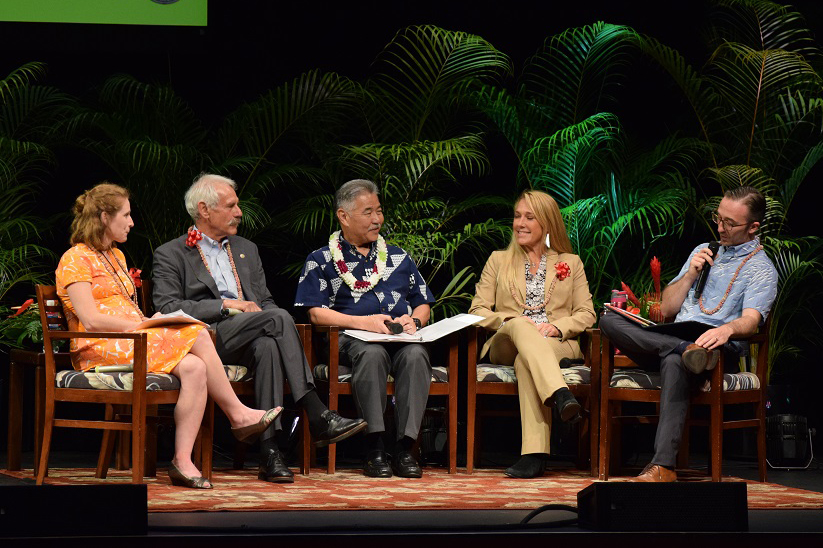
by HEC Team | Apr 25, 2019 | 2019, News
The 6th Annual Hawaii Energy Conference (HEC), held at the Maui Arts & Cultural Center on March 27-28, 2019, brought together a number of key decision makers from throughout the state, the nation, and abroad to exchange ideas on the challenges associated with replacing fossil fuels with diverse and renewable energy resources. Presented by Maui Economic Development Board (MEDB), the conference is a recognized leader in the exploration and discussion of creating new business opportunities for renewable energy, implementing innovations in regulatory and government policy, and gauging trends in renewable energy technology.
Hawaii has experienced enormous growth in distributed energy resources, primarily photovoltaic (PV) systems. This year’s conference took an in-depth look at the innovative policies and technologies that continue to allow rapid growth in PV, and compared Hawaii’s solutions with those in Colorado, California, and other states. Panel discussions covered Distributed Energy Resources, Performance-Based Regulation, and other new directions in state energy policy, innovations in regulatory policy, investment opportunities in energy, resilience in operating isolated grids, and more.
“The rapid development of new business models, regulatory processes and rules, alongside burgeoning technological improvements in energy production, delivery, and storage have wide-ranging implications for all energy stakeholders, especially those directly involved in building the energy sector of the future,” said Frank De Rego, Jr., HEC Program Committee Vice Chair, and MEDB Director of Business Development Projects. “MEDB has focused on the importance of investment, the technical and policy challenges, and the centrality of consumers in Hawaii’s 100-percent-renewable energy journey. HEC participants benefited from the conference’s thought-provoking keynote speakers, panel sessions, case studies, exhibits, and ample networking time.”
“This year’s HEC was so impressive, said Susan Tai, Hawaii Energy New Initiatives Manager. “The depth of topics, broad overview, and caliber of speakers were so informative. Industry participants from government, investment firms, and public and private partnerships, took part in challenging conversations. Discussions included regulation policies, investment opportunities, grid modernization, and more− exceeding anything I ever imagined. The wide-range of panels and speakers on how our state approaches its energy challenges, discussed the implementation of smart energy choices and emerging clean energy technologies.”
DAY 1 KEYNOTE
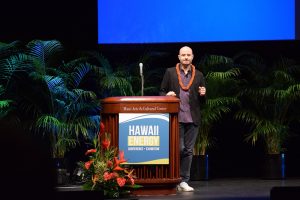
Edward Fenster, Executive Chairman of Sunrun, was the keynote on Day 1
Keynote speaker, Edward Fenster, Executive Chairman, Sunrun Inc., spoke about his company’s commitment to solar and storage in the United States. “I co-founded Sunrun with a disruptive business model; providing clean energy to homeowners without requiring them to purchase their own solar panels. We believed we could change a polluting, antiquated energy system into one that is local, responsive, and powered directly for and by consumers. Sunrun is one of the largest providers of residential solar electricity, with more than 233,000 customers,” he said. “In 2016, Sunrun launched a home battery solution, Brightbox, in Hawaii, and over 5,000 Brightboxes nationwide.”
Fenster continued, “Distributed solar and storage can help keep the lights on when the grid goes down for any reason, from hurricanes to wildfires. We need to build for resilience. Home solar and storage has the potential to revolutionize our energy system, improving the grid for everyone. We’re aggregating and optimizing residential solar and storage systems for grid services—it’s an exciting future.”
Discussing Performance-Based Regulation (PBR), Fenster noted, “Hawaii has already taken a fundamental step by requiring a break in the direct link between allowed revenues and investment levels. The need is to incentivize utilities to choose the lowest cost for energy consumers. We hope to democratize solar energy and make it accessible to everyone.”
Fenster discussed how energy sources were unavailable during Puerto Rico’s hurricane catastrophe and how we have to learn to be resilient. “We need distributed resources supporting the grid,” he said. “It is key to reduce impact of line losses of 10- percent between gross generation and net electricity sold to customers; reduce transmission capacity need and susceptibility to contingencies and natural disasters; and to provide clean, cost effective peaking capacity.”
In Puerto Rico, October 11, 2017, Sunrun distributed solar power systems and batteries to create a more resilient, reliable energy system. “What can Hawaii learn from Puerto Rico?” Fenster asked. “We need to think ahead. Is our grid strong enough to deliver power during extreme weather? If not, what can we do to mitigate a grid that’s not energized? Getting ahead and figuring out the challenge before we get hit is the lesson. Sunrun believes in building a future where energy is clean, affordable and accessible for all.”
MEMORANDUM OF UNDERSTANDING
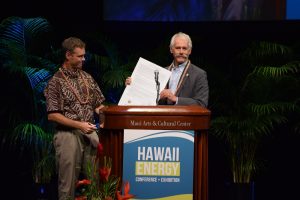
L to R: James Griffin, Chairman Hawaii PUC; Michael Picker, President California PUC
A highlight of the HEC was the signing of a landmark Memorandum of Understanding (MOU) by James Griffin, Chairman of the Hawaii Public Utilities Commission (PUC), and Michael Picker, President of the California PUC. Hawaii and California are the first states to commit to 100-percent clean-energy goals and sign historic agreements to fight climate change.
According to Griffin, “The MOU establishes a framework for the Hawaii and California PUCs to collaborate toward the implementation of clean, renewable energy. It also gives us a more formal way of sharing resources between the commissions, especially because California is an energy industry leader. We follow the California regulatory agenda closely, but having the ability to call people up directly and work with them is really a huge benefit.”
Picker noted, “California and Hawaii have the same kind of challenges. Hawaii has large amounts of solar on very thin grids, which we have in many parts of our state. We have learned by watching carefully what you are doing, and are eager to work together, staff to staff.”
Governor Ige added, “Hawaii is at the forefront for a 100-percent renewable-energy future. The goal is for utilities, consumers, and investors to have the right incentives to create a win-win for all. Hawaii’s goal is to be truly sustainable and self-reliant.”
Hawaii Commissioner Jennifer Potter explained, “The California and Hawaii PUCs will now officially collaborate to address climate change, reduce the use of fossil fuels, and reduce greenhouse gas emissions. By entering into a MOU, staff at each Commission will undertake actions within their mandate to further these goals. This was a remarkable opportunity for the Hawaii PUC to make a strong public commitment to reducing carbon emissions and accelerate clean energy in our state. I am honored to have worked on the MOU.”
HEC attendee Jared Friedman, Director, REC Solar, said, “Coming from California, where we also have a great love and respect for the beauty of our land and environment, I find inspiration in the shared goals of our states. I see how much we can learn from one another, having a shared vision of a clean energy future with great perspectives on how to get there. Hawaii, while small by population, has shown itself to be a leader in the fight to act on climate change. The bold stance taken by Hawaii to move to clean energy and carbon neutrality has started a domino effect across the U.S. where people say, ‘If they can do it, so can we.’”
Friedman, excited to attend the HEC this year to see such a broad spectrum of other attendees who are helping design the solutions, noted, “This conference is a great venue for exchanging information, about what’s worked, what hasn’t and what might be next. The climate issues we face are clearly not going to be solved by any one person, company, city or state.”
PANELS
The experts exchanged ideas on responding to the challenges associated with replacing fossil fuels with diverse and renewable energy reserves.
Panel Discussion: Moving Away from Convention: Innovations in Regulatory Policy
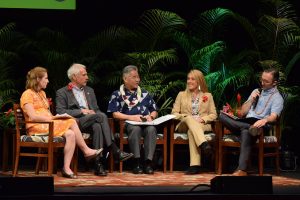
L to R: Abigail Anthony, Rhode Island PUC: Michael Picker, President of the California PUC; Governor David Ige; Jennifer Potter, Hawaii PUC; with moderator Matthew McDonnell, Navigant Energy Practice.
Governor Ige joined the panel, with Abigail Anthony, Commissioner, Rhode Island Public Utilities Commission; Michael Picker, President, California Public Utilities Commission; and Jennifer Potter, Commissioner, Hawaii Public Utilities Commission.
One of the most important issues for the Hawaii Commission right now is Performance Based Regulation (PBR), an approach to utility regulation designed to strengthen utility performance incentives. The term PBR is synonymous with Incentive Regulation. Legislation was passed in 2018 that directed the PUC to implement PBR by 2020. This bill breaks the link between utility revenues and capital investments.
Governor Ige, an engineer and defender of Hawaii’s energy policy, signed SB 2939 SD2 (Act 005) in April 2018,which requires the PUC to create the framework that will tie electric utility revenues to performance metrics rather than to capital expenditures. The bill establishes performance metrics that the PUC will consider while it establishes performance incentives and penalty mechanisms. They include: affordability of electric rates and customer electric bills; service reliability; customer engagement and satisfaction information; rapid integration of renewable energy sources; and timely execution of competitive procurement.
“The bottom line is that SB 2939 is a victory for Hawaii’s energy consumers who will see more value for their hard-earned dollars,” said Gov. Ige. “ Through its expertise and oversight, the PUC will ensure that we move aggressively toward our renewable energy and consumer protection goals while maintaining a safe, reliable and resilient electric grid operated by a financially stable utility.”
Commissioner Potter added, “The Commission has been working closely with stakeholders, consumer advocates, and the utilities to define a set of goals, outcomes and metrics that will replace the cost-of-service and rate-based regulatory model of cost recovery for the utilities. These goals include: enhancing the customer experience; improving utility performance; and advancing societal goals. The outcomes include efforts like reducing greenhouse gases, using distributed energy resources, and investing in an efficient grid.”
On February 7, 2019, the Hawaii PUC staff issued a proposal to adopt updated utility regulations to encourage the HECO companies to cost-effectively achieve state energy goals and deliver cost savings to customers.
“The current regulatory model encourages companies to make large capital investments to earn a return,” Potter explained. “Our efforts will break that link so that utilities can earn a return on providing services and programs instead of just capital investments. We must think of a broader set of regulatory mechanisms that allow the utility to move with flexibility and accelerate our path to renewable energy. Regulation is where the rubber hits the road. How we perform our function as the PUC must improve the utility and align utility performance with community interest.”
Panel Discussion: What Are the Investment Opportunities Today in Energy?
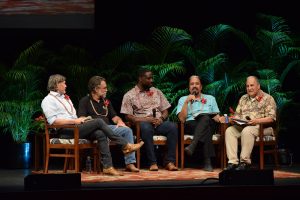
L to R: Jeffrey Ubben, ValueAct Capital; Robert King, Pacific Biodiesel Technologies; Brice Nzeukou, Ampaire; Kyle Datta, New Energy Partners and Frank De Rego, Jr., MEDB.
Frank De Rego Jr. moderated the panel. Panelists included Kyle Datta, General Partner, New Energy Partners; Brice Nzeukou, Product Manager, Ampaire; Robert King, President, Pacific Biodiesel Technologies; and Jeffery W. Ubben, Founder and Chief Executive Officer, ValueAct Capital.
Ubben said, “As energy markets and technology change over time, it is important to know how to unlock new regulatory policies for investors. Our team at ValueAct combines a diverse set of skills with extensive industry and investment experience. We believe in investing for the long-term. This requires the highest standards of integrity and a consideration of relevant social, ethical and environmental issues.”
Datta said, “I have always worked to increase the quality of life for Hawaii’s residents through more local food production, generating more renewable energy, increasing clean transportation, and supporting better management of water and waste. We need to continue to work together strategically to tackle some of our state’s biggest challenges and implement the transformative change to help Hawaii be more resilient and self-sufficient for many years to come.”
Nzeukou added, “At Ampaire, a technology innovation company developing electric aircraft and electric propulsion system concepts, we are always looking at what’s practical right now. Currently, we are looking at a hybrid electric aircraft between Kahului and Hana that is cleaner and quieter. It would reduce fuel cost, maintenance cost, and airfares. It is the first test with this technology and is headed for Maui in the fall.”
King said, “Pacific Biodiesel was founded on Maui in 1995 and is the only commercial producer of liquid biofuels in Hawaii. From the beginning, our mission has remained constant to promote a clean, sustainable energy future through the community-based production of renewable fuels. Our company is currently moving forward with a model of agriculture for clean energy, food, and our new Kuleana ‘farm to face’ beauty products. We hope to supply more jobs as our economy grows greener.”
King mentioned, “Our biggest challenge is receiving mixed signals from the government. Although our industry is going through trying times on the federal government side, the PUC and HECO support our industry. Nevertheless, we need even stronger state and local commitments in order to figure numbers.”
Panel Discussion: Sustainable Air Tourism
Moderated by Joelle Simonpietri, Simonpietri Enterprises, panelists included Neville Fernandes, Head of Renewable Jet Fuel Development Project North America, Neste US, Inc.; Aaron Robinson, Senior Manager, Environmental Strategy and Sustainability, United Airlines; and Geoffrey Tauvette, Director, Environment and Fuel, WestJet.
Simonpietri explained, “Hawaii is the most isolated land mass. It is 2600 miles from the nearest continental land mass; therefore, the most common travel to the islands is by air. Aviation is the largest sector of energy use in the state, hence the need for strategic investors in renewable fuels projects and technologies.”
Robinson said, “United Airlines is focusing on more biofuel development, energy efficiency, emissions reductions, and external communications. For years, we have experimented with biofuels, aiming to reduce both carbon emissions and our reliance on fossil fuels. Airlines account for only about two percent of annual global carbon emissions, but the industry’s rapid growth and future expansion across emerging markets has made aviation’s environmental impact a top issue for executives and regulators.”
Robinson continued, “For short flights, airlines can begin to shift to electric planes. However, electric technology is not in the near future for larger, longer flights. It’s physics. The technology just isn’t there yet.”
Fernandes added, “Neste is a keen supporter of commercializing renewable jet fuel. We are passionate in our belief that sustainable low-carbon biofuels are an important contributor to responsible management of greenhouse gases and to the fight against climate change. Neste builds sustainable solutions for the needs of transport, businesses, and consumers.”
Tauvette noted, “Aviation biofuels represent the biggest and best opportunity for aviation to significantly reduce greenhouse gas emissions. The focus now is developing sustainable sources to make the aviation biofuel, namely, finding an efficient and economical way of getting fuel from production to aircraft. It is key to have a collaboration of energy industry leaders and innovators designed to accelerate the development of a ‘fit for the future’ energy system.”
DAY 2
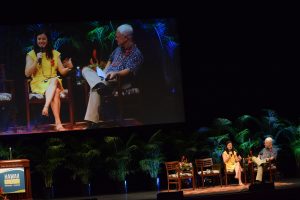
Aki Marceau and Doug McLeod open Day 2 with reflections of Day 1
The day began with Aki Marceau, Managing Director, Policy & Community-Hawaii, Elemental Excelerator; and Doug McLeod, Chair, Conference Program Committee, DKK Energy Services LLC, reviewing Day 1 issues.
McLeod discussed the importance of the MOU with California. “We can’t reach clean energy goals without partnership. We have common goals with California and we’re showing the world that collaboration can move things in an accelerated fashion.”
Marceau, agreeing, said, “Hawaii is moving along nicely on its 100-percent path. Hawaii’s credentials in solar brought us on to the world stage. Energy, water, agriculture, and other characteristics about Hawaii make it attractive to investors. Highlights of the first day were the MOU, and the numerous innovative technologies, such as electric airplanes. With a high volume of short-haul flights, Hawaii is the perfect testing ground for an electric aviation company like Ampaire−whom Elemental Excelerator is supporting.
Marceau added, “At Elemental Excelerator I work closely with policymakers and government agencies. We fund start-up businesses serving Hawaii’s energy future and engage with other players to help advance our statewide renewable goals. The Hawaii Energy Conference lays a great foundation for this networking.”
PANELS
Panel Discussion: Conversation with the Commissioners
The panel, facilitated by Gavin Bade, Senior Reporter, Utility Dive, included Abigail Anthony, Commissioner, Rhode Island PUC; James Griffin, Chair, Hawaii PUC; and David Hochschild, Chair, California PUC.
Bade noted, “The HEC is a forum for leading minds in energy transition. Hawaii is in the forefront of distributed energy, with electric vehicles, rooftop solar, and, of course, the 100-percent-renewable energy mandate. Hawaii has moved from preparation to implementation. The Hawaii PUC recently announced nine orders relating to the clean energy transition, from utility solar farms to new rates for electric charging and PBR. Hawaii did it first, showing the nation what’s actually possible.”
Citing the MOU, Griffin said, “We are working closely with California and learning from other states how to produce significant savings by means of grid improvements, modernization, and clean energy. Hawaii entered a phase-one modernization strategy of renewable regeneration, including pilot rates for electric buses, and changing our electric vehicle network for the project to continue statewide. I am proud of the progress that we have made and am committed to building on this momentum.”
Anthony added, “Rhode Island is a small northeastern state working on a clean-energy transition. We have a robust tariff program and long-term contracts for renewable off-shore wind farms. We are creating a framework for decision-making in a most cost-effective way. Additionally, we have a lot of advocates for electrification.”
Hochschild discussed high costs and solutions for the Commissions. “As we electrify, costs will definitely come down. We currently are projecting that all new public buses in California be electric by 2029. Switching exclusively to electric buses has a ton of benefits, such as cleaner air, much quieter streets, and savings in fuel costs. Hawaii’s renewable ripple affects California and the nation. Moreover, as clean energy gets cleaner it will balance the grid and satisfy consumers.”
Griffin concluded, “Current high rates in Hawaii motivate me to urgency. We need to address our problems and fossil-fuel dependency. Resilience needs to be addressed: how to sustain ourselves if tragedy hits; and how best to balance the grid, cost and risk. It’s always a challenge. It is also important to advance public policy goals, and appropriate investments. We should be clear what is needed to achieve our goals.”
Panel Discussion: Operating Isolated Grids Efficiently While Being Resilient
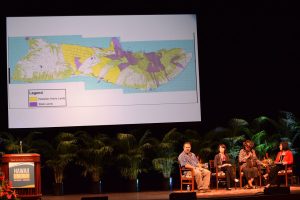
Molokai panel L to R: Mathew McNeff, Maui Electric Company, Mahina Martin, Maui Electric Company; Iolani Kuoha, Molokai Middle School;Sharon Suzuki, Maui Electric and Hawaii Electric Light.
The panel focused on Molokai’s unique challenges to realize renewable-energy goals. With one of the highest average costs and lowest average daily uses of electricity, Molokai is one of six isolated island grids in Hawaii.
Moderated by Sharon Suzuki, President, Maui Electric and Hawaii Electric Light, panelists Iolani Kuoha, STEMworks™ Facilitator and Hawaiian Immersion Teacher, Molokai Middle School; Mahina Martin, Manger, Government and Community Relations, Maui Electric Company; and Mathew McNeff, Director, Power Supply, Maui Electric Company, discussed reaching out to educate Molokai’s consumers about 100-percent-renewables.
Suzuki opened with the issues facing Molokai’s consumers and getting them onboard with renewable energy. “Molokai needed a resource plan. However, it was and is important to work there from the outside in and listen to the community. Family, culture, and community engagement mean everything on Molokai.”
Kuoha said, “Although the four-district island is without traffic lights, it is teeming with natural resources. We tend to be self-sufficient. Taught by our elders, we learned how to ‘malama’− to care for our land and how to respect what it provides. We welcome change by working together.”
Martin said, “ MECO’s effort has increased on Molokai. The company held 13 roundtable sessions and the feedback helped advance renewable-energy planning. We had meaningful dialogue and were able to lay the foundation for inclusive planning by working together in the community. We need to be mindful about the cost to the culture, the people, and the location.”
McNeff added, “A partnership with Hawaii Natural Energy Institute to install a battery energy-storage system and a load bank on Molokai brought down the cost for consumers. “We must have competitive solutions for clean resources which include incentives for customer participation,” he said.
Panel Discussion: Lessons Learned from Building in Hawaii
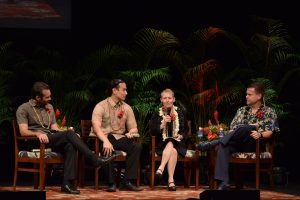
L to R: Adair Hill, Photonworks Engineering; Brent Arakaki, Hunt Companies; Mary Fox, Johnson Controls and moderator Murray Clay, Ulupono Initiative.
The panel members shared their experiences in unleashing the power of clean energy in the housing markets. With housing accounting for approximately 40- percent of greenhouse gas emissions, the panelists asked if it’s really such an outrageous idea to think affordable housing can be built in smart, connected communities that effectively manage electricity demand while providing services to the grid.
Moderated by Murray Clay, Managing Partner, Ulupono Initiative, panelists included Brent Arakaki, Project Manager, Hunt Companies (Hunt Military Communities); Adair Hill, Project Manager, Photonworks Engineering; and Mary Fox, National Vertical Market Director Public Housing, Johnson Controls.
Clay said, “Use of renewable clean energy provides a safe environment and much needed green jobs in the affordable housing market. Some think solar and renewables are for the rich only. However, the examples shown on our panel today offer the exceptional use of clean energy in diversified communities.
Arakaki explained, “Clean energy and conservation benefit all communities, not just those who can afford it. Working with the military communities means you must face the challenge of high turnover. This presents a challenge to conservation education. Part of Hunt’s energy management strategy is an energy allowance band under which families pay for the inefficiencies while being rewarded for efficiencies. We built over 7,000 units on Oahu with energy efficiency built into the homes, educating the families how to operate efficiently with energy conservation programs.”
Hill shared, “PhotonWorks is a team of dedicated professionals working to make our island home less oil-dependent through renewable energy. We are proud of our Kahauiki Village, a project built on 13 acres of state land that represents an extraordinary partnership of people and resources, giving homeless working families a new beginning. By the final phase of the project, the community will include 153 modular homes with more than 600 residents. Working with the design of plantation-style roofs, PhotonWorks strategically placed photovoltaic panels on roofs to capture and produce energy. All of the residences share the energy collected, converted and stored in the system.”
Hill continued, “PhotonWorks has been providing shelter in different forms to different communities on the Big Island, Oahu, and Kauai. The company has always had a strong feeling of responsibility for bettering our community, and this gives us another way to contribute toward our mission.”
Fox said, “I work in the federally subsidized housing space. We can do sustainability in big ways, but it’s necessary to bring sustainability to affordable housing. Ninety-nine percent of Johnson Controls’ work is retrofitting existing buildings to affordable housing. However, one of the biggest impacts has been achieved through education policies that promote conservation of energy, air and water among tenant populations. The mainland can learn from Hawaii. The state’s process, at least for solar, is smoother than elsewhere. That’s not to say it’s fast by any means, but from procurement to fees, Hawaii has set the groundwork for success.”
Panel Discussion: Does Energy Efficiency Still Matter?
Commissioner Potter, on the last panel of the conference, summed up the situation by saying, “In Hawaii it is time to look at measures at the state level, including additional metrics, new policy objectives, what we are doing, and what we want to accomplish. Hawaii continues to be a leader in Distributed Energy Resource integration and is positioned to be a leader in utility-scale renewable projects in the next five years. We are working on regulatory reform, direct response markets, microgrid initiatives, integrated grid planning, resilience, and climate-change initiatives across local and state governments. The PUC looks forward to continuing innovative practices for Hawaii on our journey together to reach our 100-percent-renewable energy future.”
Joshua Strickler from Johnson Controls, a sponsor of the 2019 Hawaii Energy Conference added, “The two-day HEC was a great place to get together with the energy community. The event has progressed from the first Maui Energy conference I attended, with the implementation of new energy projects across the state. It provided a forum for best-practice sharing, with excellence in the application of environmental sustainability strategies, partnerships, performance, and governance.”
Concluding, Strickler said, “Hawaii is a shining example for energy. It’s a combination of abundance: wind, sun, and geo-thermal. We have a sense of community here. We want to take care of it by preserving Hawaii and the planet for our future generations.”
Save the Date for 2020:
The 7th Annual Hawaii Energy Conference will be held March 18, 19 at the Maui Arts & Cultural Center.
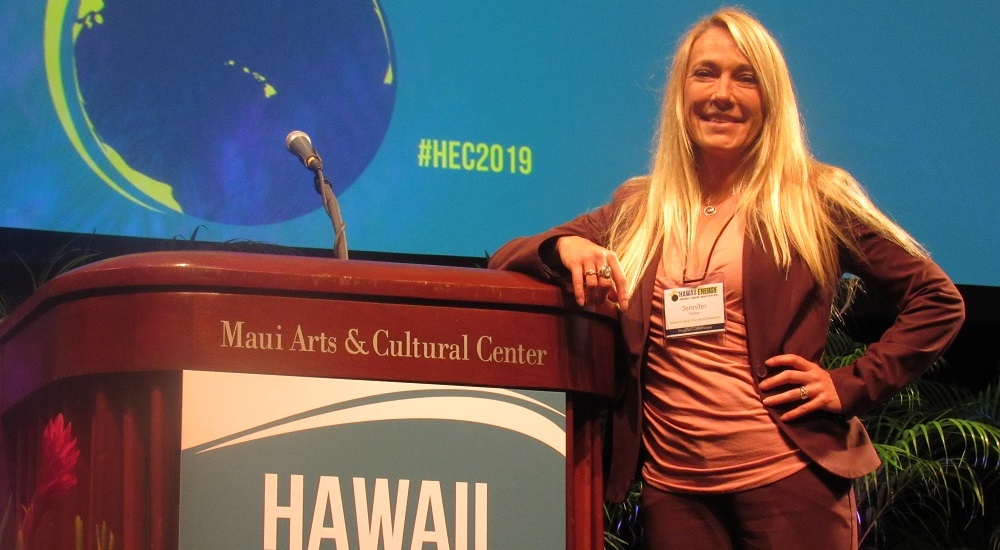
by HEC Team | Apr 11, 2019 | 2019, News
Originally published in The Lahaina News – April 11, 2019 – On March 27-28, West Side resident Jennifer Potter attended the sixth annual Hawaii Energy Conference (HEC) and Exhibition at the Maui Arts & Cultural Center in her role as commissioner on the Hawaii Public Utilities Commission (PUC).
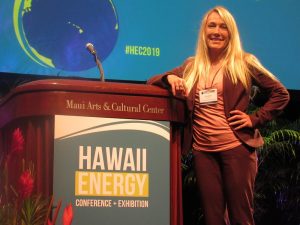
Jennifer Potter, PUC Commission
Organized by Maui Economic Development Board and supported by the County of Maui Office of Economic Development, the sixth annual conference drew over 400 people, an increase of more than 25 percent from last year.
Commissioner Potter was appointed to the PUC by Gov. David Ige in March 2018 for a term to expire in June 2024. Previously, she was a faculty member at the Hawaii Natural Energy Institute, an independent research institute within the University of Hawaii, where she conducted research on demand response, Distributed Energy Resources (DERs), locational benefits of DERs, and energy efficiency.
Potter holds a Master’s Degree of Science in Public Policy and Management from Carnegie Mellon University and a Bachelor’s Degree in International Studies and Economics from Southern Oregon University.
Committed to Hawaii’s ambitious renewable energy goals, Commissioner Potter also brings her wealth of experience as a senior scientific engineering associate at Lawrence Berkeley National Laboratory to the PUC.
“Hawaii continues to be a leader in DER integration and is positioned to be a leader in utility-scale renewable projects in the next five years,” Potter said.
“We are working on regulatory reform, direct response markets, microgrid initiatives, integrated grid planning, resilience, and climate change initiatives across local and state governments.”
Commissioner Potter became “hooked on energy” when she started working for a small electric utility in Northern California directly after graduate school.
“I analyzed how and when customers used energy,” she said. “This research was called load research and is the foundation for setting rates, forecasting load growth and sales within utilities around the country. It provides a thorough and reliable knowledge of trends and general behavior of the load characteristics of the customers serviced by the electrical industry.”
Becoming intrigued with how customer demand drives utility generation and supply, Commissioner Potter’s direction became crystal clear: customers are the main actor in the clean energy future, and when they use energy is critical.
“If customers use less energy in the evening hours when energy is generated from dirty fossil fuel plants, and instead use most of their energy during the day when solar is abundant and powering our grid, then we have changed the fuel mix of our energy. We would be using more renewable resources,” Potter said.
“The next seven years of my career were dedicated to trying to figure out how to help customers make the transition to using more clean energy and less dirty energy.”
What Commissioner Potter learned is that if you offer customers incentives, education and technologies that help control when their appliances use energy, they are willing and able to participate in the clean energy future.
“Give customers a discount on their energy use during the day, with some home automation like Alex and Nest thermostats, and it is easy for them to save money and use clean energy.” she said. “This is a significant part of my vision for Hawaii – to empower our residents to use clean energy and conserve energy where they can, without being inconvenienced. The Hawaii Electric Company (HECO) is working hard to bring renewable energy online, and we, as customers, have to do our part, too.”
Commissioner Potter continued, “The PUC recently approved Maui Electric Company’s (MECO’s) purchase power agreement with AES Renewable Energy for 60 megawatts of solar power and 240 megawatt-hours of battery capacity. MECO will pay eight cents a kilowatt hour from the solar array and battery system, the lowest cost for renewable energy on the island and much lower than fossil-fuel-generated power. The goal is to replace the Kahului Plant, which is the dirtiest and least efficient fossil fuel plant in Hawaii, with this clean energy. The solar and storage facility can produce enough energy for nearly 27,000 Maui homes at a fraction of the cost of the Kahului plant. Not only do customers get clean energy, that energy is much cheaper.”
That said, while MECO can bring the clean energy resources to the grid, customers need to help manage their energy use, so they are using the majority of energy when the solar is produced.
For example, if you have an electric vehicle, charge it during the day so that you are using clean electrons. Use a timer for your dishwasher and pre-cool your home. Buy efficient appliances, like Energy Star, and check with Hawaii Energy for rebates and programs that can lower your electric bill.
“We all have to work together to get to a 100 percent clean energy future, both the utilities and the customers,” Potter said, noting the announcement of the landmark Memorandum of Understanding (MOU) between Hawaii and California.
“The California and Hawaii PUCs will now officially collaborate to address climate change, reduce the use of fossil fuels and greenhouse gas emission,” she said. By entering into a MOU, staff at each commission will undertake actions within their mandate to further these goals. This was a remarkable opportunity for the Hawaii PUC to make a strong public commitment to reducing carbon emissions and accelerate clean energy in our state. I am honored to have worked on the MOU.”
One of the most important issues in front of the Hawaii PUC right now is Performance Based Regulation (PBR), an approach to utility regulation designed to strengthen utility performance incentives.
The term “PBR” is synonymous with incentive regulation. Legislation was passed in 2018 that directed the PUC to implement PBR by 2020 that breaks the link between utility revenues and capital investments.
“The commission has been working closely with stakeholders, consumer advocates and the utilities to define a set of goals, outcomes and metrics that will replace the cost-of-service and rate-based regulatory model of cost recovery for the utilities,” Potter said.
“These goals include: enhance the customer experience; improve utility performance; and advance societal goals. The outcomes include efforts like reducing greenhouse gases, using distributed energy resources and investing in an efficient grid.”
On Feb. 7, 2019, the Hawaii PUC staff issued a proposal to adopt updated utility regulations to encourage the HECO Companies to cost-effectively achieve state energy goals and deliver cost savings to customers.
Commissioner Potter concluded, “The current regulatory model encourages companies to make large capital investments to earn a return. Our efforts will break that link, so that utilities can earn a return on providing services and programs instead of just capital investments. We must think of a broader set of regulatory mechanisms that allow the utility to move with flexibility and accelerate our path to renewable energy. Regulation is where the rubber hits the road. How we perform our function as the PUC must improve the utility and align utility performance with community interest.”





